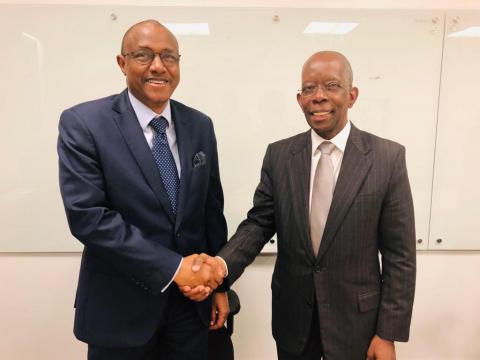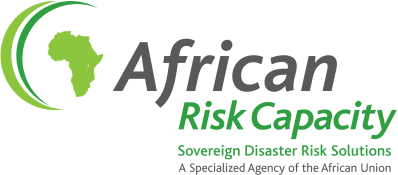
Wednesday, May 15, 2019
“Although insurance will never cover all the risks associated with a peril in each country, the ARC approach allows for the risks to be managed in a way that multiplies the benefits from limited resources available to Government.” – Mohamed Beavogui
UN-ASG / Director-General African Risk Capacity, Mohamed Beavogui and HE Adriano Afonso Maleiane, Mozambique’s Minister of Economy and Finance during one of the discussions leading to the signing of the MoU
Maputo, May 15, 2019 – The African Risk Capacity (ARC) Agency and the Government of Mozambique have signed a Memorandum of Understanding (MoU) to provide mid to long-term solutions against the recurrent episodes of drought, floods, and tropical cyclones in the country.
The MoU serves as “a framework to facilitate cooperation and collaboration between the ARC Agency and the Government, and to define the terms and conditions under which the Government and the ARC Agency will work together to address the impact of Extreme Climate Events on Mozambique, including through support provided by the ARC Agency for Mozambique, training of Government officials and other efforts in support of Mozambique objectives.”
Mozambique, which is emerging from two tropical cyclones, is vulnerable to climate change because of its location and geography which expose large areas of the country to tropical cyclones, droughts (every three to four years) and river/coastal storm surge flooding. This vulnerability is heightened by the country’s 2,470 km of coastline and socioeconomic fragility which puts infrastructure, coastal agriculture, key ecosystems and fisheries at risk.
Speaking about the signing of the MoU, the United Nations Assistant Secretary-General and Director-General of ARC, Mohamed Beavogui indicated that the aim is to work with the Government of Mozambique to understand its own risk profile vis-à-vis the various perils facing the country and develop customised response plans.
“ARC is a Development Insurance Mechanism which links risk profiling, contingency planning and a payout. “Although insurance will never cover all the risks associated with a peril in each country, the ARC approach allows for the risks to be managed in a way that multiplies the benefits from limited resources available to Government. Therefore, helping to save more lives and livelihoods at the early stage of a disaster…before the arrival of humanitarian assistance…,” ASG Beavogui stated.
“The Government of the Mozambique appreciates the onset of formal collaboration with the African Risk Capacity” said HE Adriano Afonso Maleiane, Mozambique’s Minister of Economy and Finance. “We expect that the MoU will initial a well-coordinated take-off of activities towards strengthening the capacities of our climate management authority officials as well as other personnel to better understand our risk profile and provide quicker responses in the event of natural disasters,” he concluded.
Under the MoU, the Government of Mozambique and the ARC Agency will work together through the Program to prepare for the potential participation of the Government as an ARC Ltd member. At the end of the Program, the Government will decide whether to participate in ARC Ltd and its level of participation.
Government involvement in the Program does not commit it to participate in ARC Ltd but rather support an informed decision-making process on climate risk insurance.
ARC is working with other development partners including the African Development Bank as well as the World Bank towards a premium financing support to Mozambique when it decides to take the sovereign disaster risk insurance coverage.
# # #
About African Risk Capacity (ARC): ARC consists of ARC Agency and ARC Insurance Company Limited (ARC Ltd). ARC Agency was established in 2012 as a Specialized Agency of the African Union to help Member States improve their capacities to better plan, prepare and respond to weather-related disasters. ARC Ltd is a mutual insurance facility providing risk transfer services to Member States through risk pooling and access to reinsurance markets; it is owned by Member States with active insurance policies while the KfW Development Bank and the UK Department of International Development are capital contributors.
With the support of the United Kingdom, Germany, Sweden, Switzerland, Canada, France, The Rockefeller Foundation and the United States, ARC assists AU Member States in reducing the risk of loss and damage caused by extreme weather events affecting Africa’s populations by providing, through sovereign disaster risk insurance, targeted responses to natural disasters in a more timely, cost-effective, objective and transparent manner. ARC is now using its expertise to help tackle some of the other greatest threats faced by the continent, including outbreaks and epidemics.
Media Enquiries:
Chinedu Moghalu chinedu.moghalu@africanriskcapacity.org





